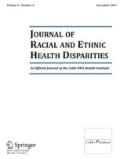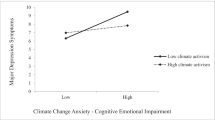Abstract
Background
Police brutality towards racially minoritized populations is structural racism. Even though most of the research on the health impacts of police brutality centers the experiences of men, women are also harmed by this structural violence.
Objectives
We identify factors associated with the anticipatory stress of police brutality among women and examine its relationship with depressed mood across ethno-racial categories.
Methods
Data came from the cross-sectional Survey of the Health of Urban Residents in the United States (N = 2796). Logistic regressions were used to identify factors associated with odds of always worrying about the possibility of becoming a victim of police brutality and to examine its association with depression among Latinas, Black, and White women.
Results
Odds of always worrying about police brutality were greater among Black women and Latinas compared to White women. Household history of incarceration was associated with anticipation of police brutality among Black women and Latinas but not among White women. Black women and Latinas with constant anticipation of police brutality and history of incarceration of a household member during their childhood had elevated odds of depressed mood.
Conclusion
Although police brutality harms all women, the stressful anticipation of police brutality does not burden all women equally. Structural racism in communities of color continues to be associated with the anticipatory stress of police brutality and it harms the mental health of women of color. Developing policies to eliminate structural racism and for the allocation of resources to persons who are strongly impacted by these injustices is important.
Similar content being viewed by others
References
Alang S, McAlpine D, McCreedy E, Hardeman R. Police brutality and black health: setting the agenda for public health scholars. Am J Public Health. 2017;107.
Bandes S. Patterns of injustice: Police brutality in the courts. BuffLRev. 1999;47:1275.
Sewell AA. The illness associations of police violence: differential relationships by ethnoracial composition. In: Sociological Forum. 2017. p. 975–97.
Kerrison EM, Sewell AA. Negative illness feedbacks: high-frisk policing reduces civilian reliance on ED services. Health Serv Res. 2020;55:787–96.
Yazdiha H, Boen CE, Yazdiha H, Boen C. 2022 “It’s a stomachache filled with stress”: tracing the uneven spillover effects of racialized police violence using Twitter data. Curr J Divers Scholarsh Soc Chang. https://doi.org/10.3998/NCIDCURRENTS.1780.
Turney K. Depressive symptoms among adolescents exposed to personal and vicarious police contact. 2020;11:113–33. https://doi.org/10.1177/2156869320923095.
Shepherd JP, Sumner SA. Policing and public health—strategies for collaboration. JAMA. 2017;317:1525–6.
Alang S. The more things change, the more things stay the same: race, ethnicity, and police brutality. Am J Public Health. 2018;108:1127–8.
Armstead TL, Wilkins N, Nation M. Structural and social determinants of inequities in violence risk: a review of indicators. J Community Psychol. 2021;49:878–906.
Gilbert KL, Ray R. Why police kill Black males with impunity: applying public health critical race praxis (PHCRP) to address the determinants of policing behaviors and “justifiable” homicides in the USA. J urban Heal. 2016;93:122–40.
Boddie EC. Racially territorial policing in Black neighborhoods. U CHI L REV. 2022;89:477.
DeVylder JE, Anglin DM, Bowleg L, Fedina L, Link BG. Police violence and public health. Annu Rev Clin Psychol. 2021;18:527–52.
Boyd RW. Police violence and the built harm of structural racism. Lancet. 2018;392:258–9.
Bailey ZD, Feldman JM, Bassett MT. How structural racism works—racist policies as a root cause of US racial health inequities. N Engl J Med. 2021;384:768–73.
Bonilla-Silva E. What makes systemic racism systemic? Sociol Inq. 2021;91:513–33.
Hadden SE. Slave patrols: law and violence in Virginia and the Carolinas. MA: Harvard University Press Cambridge; 2001.
Muhammad KG. The foundational lawlessness of the law itself: racial criminalization & the punitive roots of punishment in America. Daedalus. 2022;151:107–20.
Lepore J. The invention of the police. New Yorker. 2020. p. 13. https://altbanking.net/wp-content/uploads/2021/04/Jill-Lepore-The-Invention-of-the-Police_The-New-Yorker.pdf. Accessed 31 Mar 2022.
Delgado R. The law of the noose: a history of Latino lynching. Harv CR-CLL Rev. 2009;44:297.
Clark R, Anderson NB, Clark VR, Williams DR. Racism as a stressor for African Americans: a biopsychosocial model. Am Psychol. 1999;54:805.
George LK, Lynch SM. Race differences in depressive symptoms: a dynamic perspective on stress exposure and vulnerability. J Health Soc Behav. 2003;44:353–69.
DeVylder J, Fedina L, Link B. Impact of police violence on mental health: a theoretical framework. Am J Public Health. 2020;110:1704–10.
McLeod MN, Heller D, Manze MG, Echeverria SE. Police interactions and the mental health of Black Americans: a systematic review. J Racial Ethn Heal Disparities. 2020;7:10–27.
Brown TN. Race, racism, and mental health: elaboration of critical race theory’s contribution to the sociology of mental health. Contemp Justice Rev. 2008;11:53–62.
Pieterse AL, Todd NR, Neville HA, Carter RT. Perceived racism and mental health among Black American adults: a meta-analytic review. J Couns Psychol. 2012;59:1.
Himmelstein MS, Young DM, Sanchez DT, Jackson JS. Vigilance in the discrimination-stress model for Black Americans. Psychol Health. 2015;30:253–67.
Williams DR. Stress and the mental health of populations of color: advancing our understanding of race-related stressors. J Health Soc Behav. 2018;59:466–85.
Hicken MT, Lee H, Ailshire J, Burgard SA, Williams DR. “Every shut eye, ain’t sleep”: the role of racism-related vigilance in racial/ethnic disparities in sleep difficulty. Race Soc Probl. 2013;5:100–12.
Ritchie AJ. Invisible no more: police violence against Black women and women of color. Boston: Beacon Press; 2017.
Turney K. Stress proliferation across generations? Examining the relationship between parental incarceration and childhood health. J Health Soc Behav. 2014;55:302–19.
Garc\’\ia SJ. Living a deportation threat: anticipatory stressors confronted by undocumented Mexican immigrant women. Race Soc Probl. 2018;10:221–34.
Pearlin LI, Schieman S, Fazio EM, Meersman SC. Stress, health, and the life course: some conceptual perspectives. J Health Soc Behav. 2005;46:205–19.
Pearlin LI, Bierman A. Current issues and future directions in research into the stress process. In: Handbook of the sociology of mental health. Springer; 2013. p. 325–40.
Kahn KB, Goff PA, Lee JK, Motamed D. Protecting whiteness white phenotypic racial stereotypicality reduces police use of force. Soc Psychol Personal Sci. 2016;7:403–11.
Greco V, Roger D. Uncertainty, stress, and health. Pers Individ Dif. 2003;34:1057–68.
Hicken MT, Lee H, Morenoff J, House JS, Williams DR. Racial/ethnic disparities in hypertension prevalence: reconsidering the role of chronic stress. Am J Public Health. 2014;104:117–23.
Jackson FM, James SA, Owens TC. Anticipated negative police-youth encounters and depressive symptoms among pregnant African American women: a brief report. J Urban Heal. 2017;94:259–65.
Bowleg L, del R\’\io-González A, Mbaba M, Boone CA, Holt SL. Negative police encounters and police avoidance as pathways to depressive symptoms among US Black men, 2015--2016. Am J Public Health. 2020;110:S160--S166.
Alang S, McAlpine D, McClain M. Police encounters as stressors: associations with depression and anxiety across race. Socius. 2021;7:2378023121998128.
Alang S, Pando C, McClain M, Batts H, Letcher A, Hager J, et al. Survey of the health of urban residents: a community-driven assessment of police brutality and conditions salient to the health of populations marginalized by structural inequalities in the United States. J Racial Ethn Heal Disparities. 2021;8:953–72.
Kroenke K, Spitzer RL, Williams JBW, Löwe B. The patient health questionnaire somatic, anxiety, and depressive symptom scales: a systematic review. Gen Hosp Psychiatry. 2010;32:345–59.
Williams DR. Measuring discrimination resource. 2016. https://icmglt.org/wp-content/uploads/2021/11/discrimination_resource_dec._2020.pdf. Accessed 1 Mar 2022.
Trends in U.S. corrections. Sentencing Project. 2021. https://www.sentencingproject.org/publications/trends-in-u-s-corrections/. Accessed 10 Mar 2022.
Wildeman C, Wang EA. Mass incarceration, public health, and widening inequality in the USA. Lancet. 2017;389:1464–74.
Thoits PA. Stress and health: major findings and policy implications. J Health Soc Behav. 2010;51(Suppl):S41-53.
Feagin JR. Living with racism: the black middle-class experience. Boston: Beacon Press; 1995.
Jahn JL, Krieger N, Agénor M, Leung M, Davis BA, Weisskopf MG, et al. Gestational exposure to fatal police violence and pregnancy loss in US core based statistical areas, 2013–2015. Clin Med. 2021;36:1–7.
Freedman AA, Papachristos A, Smart BP, Keenan-Devlin LS, Khan SS, Borders A, et al. Complaints about excessive use of police force in women’s neighborhoods and subsequent perinatal and cardiovascular health. Sci Adv. 2022;8:1–9.
Pasek J. When will nonprobability surveys mirror probability surveys? Considering types of inference and weighting strategies as criteria for correspondence. Int J Public Opin Res. 2016;28:269–91.
Pierre A, Haile R, Ferguson L, Williams MXD. Invest in Black Futures: a public health roadmap for safe NYC neighborhoods. 2022. https://issuu.com/bkmovement/docs/bmc_blackfuturesreport_v5. Accessed 30 June 2022.
Funding
Data collection for this work was supported by Faculty Innovation Grant (2017), Lehigh University. The authors declare that no additional funds, grants, or other support were received during the preparation of this manuscript.
Author information
Authors and Affiliations
Contributions
Sirry Alang conceptualized the study and conducted the analyses. Rahwa Haile and Sirry Alang wrote the first draft of the manuscript. Mary Mitsdarffer and Cortney VanHook assisted with writing the background and framing context and the relevance of the article. All authors commented on previous versions of the manuscript. All authors approved the final manuscript.
Corresponding author
Ethics declarations
Ethics Approval
The Lehigh University Institutional Review Board reviewed and determined the study as exempt.
Consent to Participate
Informed consent was obtained from all respondents in the Survey of the Health of Urban residents.
Conflict of Interest
The authors declare no competing interests
Additional information
Publisher’s Note
Springer Nature remains neutral with regard to jurisdictional claims in published maps and institutional affiliations.
Rights and permissions
Springer Nature or its licensor holds exclusive rights to this article under a publishing agreement with the author(s) or other rightsholder(s); author self-archiving of the accepted manuscript version of this article is solely governed by the terms of such publishing agreement and applicable law.
About this article
Cite this article
Alang, S., Haile, R., Mitsdarffer, M.L. et al. Inequities in Anticipatory Stress of Police Brutality and Depressed Mood Among Women. J. Racial and Ethnic Health Disparities 10, 2104–2113 (2023). https://doi.org/10.1007/s40615-022-01390-8
Received:
Revised:
Accepted:
Published:
Issue Date:
DOI: https://doi.org/10.1007/s40615-022-01390-8




